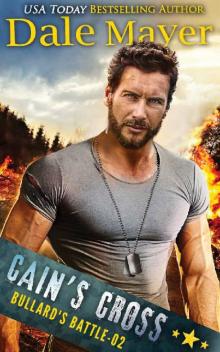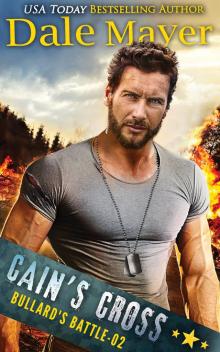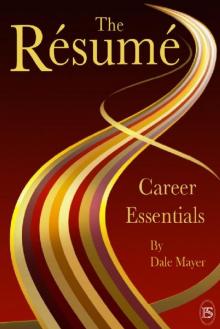- Home
- Dale Mayer
Tucker Page 7
Tucker Read online
Page 7
He glanced at her, caught her gaze, and smiled when he saw the flush on her cheeks. “I don’t care about other people,” he said. “I will go by a dog’s barometer before I’ll go by a human’s. Dogs know instinctively who’s good and who’s bad, and they have a tendency to stay away from those who aren’t any good. And your sister is evil.”
“I know, but she’s my sister. I don’t know that she’s that bad. I think she’s just spoiled, entitled, lazy. But evil? I don’t know.”
Tucker shook his head. “Nope. No way I’m wrong about her. That’s just you projecting your goodness on that hellhole who is your sister.”
She stared at him. Not shocked but assimilating. “I hope not, but I haven’t seen her in a good light in a long time,” she said with a shrug.
“Well, your parents have created a monster, and that monster’s their problem. They don’t get to foist it off on the world because they don’t want to deal with it.”
“I think a lot of parents out there are in the same boat,” she said quietly. “And I get that, for you, my sister has no redeeming factors, but she does. Everybody does.”
“Maybe,” he said, “but it’ll take a long cold winter in hell before I’ll see it.”
“Because everything to you is black-and-white?”
“Absolutely not. It used to be, but it’s not,” he said. “It’s all about how you look after the animals of the world, the innocent victims, children as well,” he amended. “You can’t just choose to look after only yourself. The world isn’t like that.”
“Or the world is exactly that,” she argued.
“But it shouldn’t be,” he said. He looked at her to see her nodding.
“No, it shouldn’t be,” she said, “but too often it is.”
“And you’ve seen some of the ugliness of human nature in your job too, haven’t you?”
“Too, too much,” she said. “I used to be an ER nurse, and I just … I couldn’t handle a lot of it, so I switched into a general practice, and now I work at a doctor’s office.”
“Nothing wrong with that either,” he said.
“Nothing wrong with it, just a very different pace to what I was used to,” she said with a half smile. “And now, of course, it’s a lot calmer and a lot less trauma.”
“Yes,” he said, nodding. “I used to do missions where governments were being taken over and kidnappings were happening, and then, you know, boats were being boarded and passengers shot for the little bit of jewelry they had.” He shook his head, then continued. “In some parts of the world, life is tough, and it’s hard to make a living, but, more than that, it’s all about themselves. It’s all about doing what they want to do instead of what’s right for everyone. Makes living a little bit harder for all of us.”
“Is that the kind of work you used to do?”
“Yes,” he said, “and I would be in that job for the rest of my life if I’d had a choice. Of course, most SEALs retire after eight to ten years. It’s too hard on our physical bodies. However, I’m proud of the years of service I gave my country,” he said, “and I don’t begrudge the injuries I have from that. It’s just frustrating that it was ‘friendly fire.’”
“I’m not even sure how one explains that,” she said. “I’ve heard the term several times, but I can’t imagine the sense of betrayal.”
“Still,” he said, “it is what I have yet to deal with, so it doesn’t matter how I feel about it. I’ve got to deal with it eventually.”
“And, of course, dealing with it isn’t just a case of saying, I’ve dealt with it. It’s so much more,” she murmured.
“Yep.”
“Did you ever see a therapist for help?”
“Absolutely,” he said, “a lot of people. Sometimes you have to go through a couple to find ones who work with you and work for you,” he said.
“I can see that,” she said. “I saw somebody when I was a teenager because I couldn’t handle my sister.”
He gave a snort at that. “I am not surprised,” he said. “She is more than a handful.”
“Back at the time I was dealing with all those insecurity issues too. Nothing like puberty to make a mess of your life,” she said with a grin.
“Well, I hope you sorted that out.”
“I did,” she said. “It was a matter of deciding who was responsible for the mess that she was, and it wasn’t me, so that made it a lot easier for me to walk away.”
“Absolutely,” he said.
She looked around and asked, “How much longer is the drive to the apartment complex?”
“It’s a long way off. At least an hour more still. I guess I should have told you that first.”
Chapter 5
“It doesn’t matter,” Addie said, settling in. “I’m just happy to not be sitting at home, hating my sister and my life.”
“Nope,” he said, “you’re on a pathway with a dog that’s just been freed from certain death, and we’re off to do good works.” They both checked out Bernie, smiling to find her peacefully dozing.
“I like the sound of that. It’s one of the reasons I went into nursing,” she said. “I wanted to help people. I wanted to do something to help others. I didn’t want to get stuck in that rut of being only caught up in the ‘poor me’ cycle.”
“When you’re raised with it all around you,” he said, “I think you do two things. You either get sucked into it, and you become a mini-me, or you get to the point where you look around and say, ‘That’s not what I want for my life,’ and you find a way out.”
“Well, I found a way out, but then I found trauma nursing very difficult to handle.”
“That doesn’t mean it’s a failure on your part,” he said.
She shook her head. “I didn’t expect you to pick up on that.”
“It’s amazing what we think of as failures,” he said, “because I did the same thing after my accident. I figured it was my fault that I’d gotten shot. And, of course, nobody would even listen to that theory because it was garbage. Of course it was garbage. I wasn’t responsible, and I wasn’t at fault for having taken a bullet. But I felt like I’d let everybody else down, let my team down, because I couldn’t be there for them anymore.”
“Survivor guilt,” she murmured. “Or just plain guilt. Seems like, if we don’t have a reason to rack ourselves up and down over these things, we create a reason.”
“Isn’t that the truth,” he said with a grin.
“See? We have a lot in common,” she said, slowly liking him more and more. Of course she loved him for saving Bernie—the dog—right at the beginning. Being decisive with a take-charge attitude also appealed in a big way.
“We do,” he said, nodding.
She looked over at him. “Where have you been staying before you came here for the dog?”
“I was in New Mexico, in Santa Fe,” he said with a bright smile, “with friends of mine.” And he explained about Badger and Badger’s team.
“Wow,” she said, “that is a nice thing to hear. The fact that they are still friends after all that and the fact that they’ve rebuilt their lives, giving purpose to it, that’s huge.”
“It is,” he said, “and we often forget that they did it themselves. So we have to give them credit for all that as well.”
Their trip was completed a few minutes later, as Tucker followed the GPS’s directions, and they pulled into the parking lot to see a man standing outside his white truck, waiting for them. “That’s my soon-to-be brother-in-law, Rodney,” Tucker murmured.
They hopped out, and she came around to Tucker’s side, eyeing the tall sandy-haired man with a bridge of freckles. He grinned at the sight of Addie and held out his hand to shake hers. Tucker made the introductions, then stepped back and brought Bernie forward.
Rodney crouched in front of Bernie, held out his hand. She was very well mannered, sniffed his hand, her tail wagging; then she looked up and nudged his hand with her nose. “So this is the dog that we’re talking about?”
“Yep, she was trained for fire, arson, bombs as well,” Tucker said.
“Well, let’s hope no bombs are here,” Rodney said. “But I’ll take all the help I can get. I can’t keep this up.”
“No, it’s usually a simple case for the dog,” he said. “How many crewmembers do you have here right now?”
“Too many and they’re all looking for paychecks,” he said with feeling.
“Well, take me first to the arson scene,” Tucker said. “Then we’ll talk.”
“I want to watch you and the dog work,” Rodney said.
“That’s fine. The only thing is, I don’t know if Bernie will take it as a distraction, once we get to the fire site,” Tucker said, pointing to the dog. “And the fewer distractions, the better, since the dog is well trained, but I’m not.”
Rodney hesitated and nodded. “I’ll stay in the background.” He looked at Addie. “Are you going?”
“Absolutely,” she said. And she walked up to Tucker’s side. “You don’t have a problem with me coming, do you?”
He hitched out his elbow, and she tucked her hand in because it felt right, and Rodney led the two of them to the respective building. She didn’t know who this Tucker guy was, but she knew she wanted to get to know him a whole lot more than she had. She knew Rodney eyed them speculatively too, figuring out just what their relationship was, and she was okay with that. Because, if he figured it out, he was doing better than they were. And, with that, they walked into the building.
A few feet inside, Tucker stopped, and both the dog and Addie stood beside him and stared. “Interesting fire pattern,” he murmured, staring at the skeleton remains around them.
Rodney behind him said, “Exactly, right?”
“It’s concentrated in the far corner of basically this unfinished portion of this building,” he said. “You haven’t got a roof on this one yet.”
“I know, so the damage is a whole lot less here, but structurally all these trusses have to be replaced.” Rodney pointed up to where some of the fire had charred the wood.
“And yet,” Tucker suggested, “it could have been so much worse.”
“Which begs the question as to whether the firebug had intentionally set this to do minimal damage or if he’s just not good at this.”
“A first-time firebug? Yeah, could be,” Tucker added. He stopped to look at his brother-in-law and asked, “Have you been threatened at all?”
The question completely took the color right out of Rodney’s face. He stared at Tucker in shock. “How did you know that?”
“Because this would be the next step,” Tucker said. “So why don’t you start from the beginning and tell me what’s going on.”
“I don’t even know what’s going on,” he said in frustration. “It makes no sense. A couple months ago I started getting some protestors, people blockading us, not letting us drive in, all about this construction here. We’ve got all the permits. We did all our due diligence, and everything’s clear to go.”
“So it’s locals?”
“Well, certainly a lot of locals seemed pissed off about it, but nobody would give us a reason as to why, not a legal one. Just that they didn’t want this condominium complex here. They wanted to keep their pristine land unobstructed and don’t want the community to get any bigger.”
“Which is an old story,” Addie said. “It’s beautiful around here. I can see, if I had lived here all my life, how I probably wouldn’t want to see growth and commerce coming in either.”
“It’s also a very poor area,” Rodney said, “and everybody has to commute a long way for work.”
“Which is what people moving in have to do as well, correct?” Addie asked.
“Yes,” he said, “it’ll add to the sleeping community feel of the place, but very little affordable housing is in town, and, because this is out of town, it will be that much more affordable.”
“Was this a popular hiking trail or something like that?” she asked, Tucker listening in.
“Not really,” Rodney said. “However, it was one of the original homesteads. We bought it for a song because the heir apparent just wanted his cash.”
“Maybe if the locals knew that,” Tucker said, “it would make them more upset.”
“Maybe, but that’s hardly our fault that he went ahead to sell it, is it?”
“No, of course it isn’t, but you also know that emotions run strong and deep when it comes to things like this.”
“I do know,” he said. “I thought all their other arguments were thin. We couldn’t find anything that was reasonable in any of their complaints.”
“It doesn’t have to be reasonable,” Tucker said. “It’s more emotional than that. You’re a property developer, and generally you’re looking at the bottom line, whereas they’re looking at all the intangible reasons why this building shouldn’t go up here. But back to the real issue, other than their original threat, what other threats have you had?”
“Well, a lot of letter-writing, contacting the various layers of government, little bits and pieces that we’ve dealt with many times at other projects. Then I started getting these weird letters left on my vehicle,” he said. “They all seemed to be the same. They’re cut-from-the-newspaper type notes, and they all say ‘Stop work on this project.’ No reason given. Nothing. Just stop. I have a whole bunch of them in my vehicle.”
“So obviously somebody local. And I’ll want to take a look at them afterward,” Tucker said. “Did you contact the cops?”
“I did,” he said immediately, “but they didn’t seem to be too bothered.”
“Now that arson’s involved, how do they feel about it?”
“The cops said this was an accident,” he said, “which is why I wasn’t connecting the two events. But then I called in the fire inspector.”
“Well, it’s obviously not an accident,” Tucker said. “The question is why.”
“What? Why burn it? Why try to stop the building?”
“Both,” Tucker said. “I get that they probably got so frustrated by following the legal routes that they realized maybe, if they could bankrupt you, then the building would just follow and lie here unfinished.”
“Is that any better?” Rodney said starkly. “I mean, look at it. It’s not very pretty.”
“But it’s off the highway, and it does give whoever’s doing this a certain sense of power that he managed to stop something. A lot of times people feel very ineffectual because they feel small compared to corporations or government, and they don’t think they can do anything—which is true to a certain extent—but, at the same time, once they do take that next step and burn something down, they need bigger projects because they need to have that sense of accomplishment all the time.”
“I don’t like the sound of any of that,” Rodney said.
“And that’s not the issue right now either,” Tucker acknowledged. “What we must sort out is, what will we do about it?”
“I don’t think we can do anything,” he said. “I mean, look at the place. I’ve got an insurance investigator out here already too, doing a full walk-through, and he did call me and admit that he thought it was arson.”
“Who is it?”
“I don’t know,” Rodney said. “He’s from out of state. The insurance adjuster sent him.”
“No fire inspection here locally?”
“Coming soon, but the insurance companies wanted their person out here.”
“And if the insurance doesn’t cover it, then what?”
Rodney swallowed visibly. “Well, that would not be very good news. Matter of fact, that would be really ugly news for me.”
“Enough to shut you down?”
He thought about it and said, “I’d have to find some new investment money,” he admitted. “Which means, at the end of the day, less money for me, if there’ll be any at this point,” he said, “because I have to pay the workers in order to keep them. Otherwise they’ll find new jobs, and, when I ge
t back to work again, I can’t find anybody.”
“You don’t contract for the job?”
“Well, I do, but, if the job has to stop, what am I supposed to do with my crew? And what are they supposed to do?” he said. “Everybody has to get paid. I can hardly blame them for taking on other work.”
“I get it,” Tucker said with a smile. “It’ll be interesting getting to the bottom of this one.”
“I’m not sure there’s any bottom to get to though,” he said. “Seriously the cops didn’t seem to be too bothered.”
“And mostly because the cops probably don’t see it as arson. But the insurance investigator should be contacting them about that.”
“Maybe. He didn’t seem to care either. Neither did he give me a definite answer.”
“Oh, he’ll care the most, as they have to pay for the damages. So he’s looking for any way to make this something that’s not covered and their liability.”
“Well, I am covered for arson,” he said. “These kinds of ventures are too expensive. I can’t underwrite everything.” He shook his head in frustration. “It’s crappy timing with the wedding and all.”
“But it doesn’t affect the wedding, does it?”
“No, not really, just frustrating.” Rodney looked down at the dog. “What can she do?”
“I’m not sure yet,” he said. “I need to walk her around. Certain commands start her working, and other commands keep her working, but she’s been out of practice, and I don’t know all the commands,” he admitted. “It was still worth a try bringing her.”
“What do you want me to do?” Addie asked.
“Just stay out of the way and don’t distract Bernie,” Tucker said, not sure how this would work. Bernie was looking at him for guidance, but he had little to give. “I’ll walk her around and see if I can get her to signal anything.”
“I’ll go back with Rodney,” she said, and Addie released Tucker’s arm and stepped back. She and Rodney stopped at the front entrance. Tucker reached down and murmured something to Bernie that Addie couldn’t quite hear and then asked Bernie, “You ready to go to work?”

 Finn
Finn Cain's Cross (Bullard's Battle Book 2)
Cain's Cross (Bullard's Battle Book 2) Heath: A Hathaway House Heartwarming Romance
Heath: A Hathaway House Heartwarming Romance Killian
Killian Keane
Keane Melissa: A Hathaway House Heartwarming Romance
Melissa: A Hathaway House Heartwarming Romance Denton: A Hathaway House Heartwarming Romance
Denton: A Hathaway House Heartwarming Romance Colton: SEALs of Honor, Book 23
Colton: SEALs of Honor, Book 23 Ice's Icing: A SEALs of Honor World Novel (Heroes for Hire Book 20)
Ice's Icing: A SEALs of Honor World Novel (Heroes for Hire Book 20) Elliot (Hathaway House Book 5)
Elliot (Hathaway House Book 5) Unmasked
Unmasked Zack's Zest: A SEALs of Honor World Novel (Heroes for Hire Book 24)
Zack's Zest: A SEALs of Honor World Novel (Heroes for Hire Book 24) Lucas
Lucas Lennox
Lennox Kerrick
Kerrick Nico (The Mavericks Book 8)
Nico (The Mavericks Book 8) Baylor: SEALs of Honor, Book 26
Baylor: SEALs of Honor, Book 26 SEALs of Honor: Kanen
SEALs of Honor: Kanen Brock
Brock SEALs of Honor: Taylor
SEALs of Honor: Taylor Greyson (The K9 Files)
Greyson (The K9 Files) Jackson
Jackson Corpse in the Carnations
Corpse in the Carnations Lance: A Hathaway House Heartwarming Romance
Lance: A Hathaway House Heartwarming Romance Biker Baby Blues--Morgan Book 4
Biker Baby Blues--Morgan Book 4 Cain's Cross
Cain's Cross Ice Pick in the Ivy (Lovely Lethal Gardens Book 9)
Ice Pick in the Ivy (Lovely Lethal Gardens Book 9) Blaze
Blaze Iain: A Hathaway House Heartwarming Romance
Iain: A Hathaway House Heartwarming Romance Tucker (The K9 Files Book 13)
Tucker (The K9 Files Book 13) Weston
Weston Jax (The Mavericks Book 3)
Jax (The Mavericks Book 3) Simon Says... Jump (Kate Morgan Thrillers Book 2)
Simon Says... Jump (Kate Morgan Thrillers Book 2) Nabbed in the Nasturtiums
Nabbed in the Nasturtiums Kano's Keep
Kano's Keep Jewels in the Juniper (Lovely Lethal Gardens Book 10)
Jewels in the Juniper (Lovely Lethal Gardens Book 10) Ryker (The Mavericks Book 6)
Ryker (The Mavericks Book 6) Miles
Miles Asher (The Mavericks Book 5)
Asher (The Mavericks Book 5) Ice Maiden : A Psychic Visions Novel
Ice Maiden : A Psychic Visions Novel Aaron
Aaron Jaden: A Hathaway House Heartwarming Romance
Jaden: A Hathaway House Heartwarming Romance Deep Beneath: A Psychic Vision Novel
Deep Beneath: A Psychic Vision Novel Parker (The K9 Files Book 6)
Parker (The K9 Files Book 6) Ethan
Ethan Lucas (The K9 Files Book 5)
Lucas (The K9 Files Book 5) Snap, Crackle ...
Snap, Crackle ... Tanner: SEALs of Honor, Book 18
Tanner: SEALs of Honor, Book 18 Shane
Shane SEALs of Honor: Baylor
SEALs of Honor: Baylor Heath
Heath Handcuffs in the Heather
Handcuffs in the Heather Finn (Hathaway House Book 6)
Finn (Hathaway House Book 6) Noah's Nemesis
Noah's Nemesis Elliot
Elliot Jaden
Jaden Kerrick (The Mavericks Book 1)
Kerrick (The Mavericks Book 1) Ryland’s Reach (Bullard's Battle Book 1)
Ryland’s Reach (Bullard's Battle Book 1) Evidence in the Echinacea (Lovely Lethal Gardens Book 5)
Evidence in the Echinacea (Lovely Lethal Gardens Book 5) Rowan (The K9 Files Book 10)
Rowan (The K9 Files Book 10) Gregory
Gregory Reyes’s Raina
Reyes’s Raina The Final Reveal
The Final Reveal Cat's Claus
Cat's Claus Jerricho
Jerricho Vince's Vixen
Vince's Vixen Jax
Jax From the Ashes: A Psychic Visions Novel
From the Ashes: A Psychic Visions Novel Johan's Joy
Johan's Joy Simon Says... Hide (Kate Morgan Thrillers Book 1)
Simon Says... Hide (Kate Morgan Thrillers Book 1) Keane (The Mavericks Book 9)
Keane (The Mavericks Book 9) Gavin (The Mavericks Book 11)
Gavin (The Mavericks Book 11) Fallon's Flaw
Fallon's Flaw Johan's Joy: A SEALs of Honor World Novel (Heroes for Hire Book 21)
Johan's Joy: A SEALs of Honor World Novel (Heroes for Hire Book 21) Dezi’s Diamond
Dezi’s Diamond Gavin
Gavin Keith: A Hathaway House Heartwarming Romance
Keith: A Hathaway House Heartwarming Romance Eton's Escape (Bullard's Battle Book 3)
Eton's Escape (Bullard's Battle Book 3) Eton's Escape
Eton's Escape Galen's Gemma
Galen's Gemma Jewels in the Juniper
Jewels in the Juniper SEALs of Honor: Axel
SEALs of Honor: Axel Aaron: A Hathaway House Heartwarming Romance
Aaron: A Hathaway House Heartwarming Romance Gun in the Gardenias (Lovely Lethal Gardens Book 7)
Gun in the Gardenias (Lovely Lethal Gardens Book 7) Diesel (The Mavericks Book 13)
Diesel (The Mavericks Book 13) Kurt (The K9 Files Book 12)
Kurt (The K9 Files Book 12) Miles (The Mavericks Book 7)
Miles (The Mavericks Book 7) Dagger in the Dahlias
Dagger in the Dahlias Geir
Geir Handcuffs in the Heather (Lovely Lethal Gardens Book 8)
Handcuffs in the Heather (Lovely Lethal Gardens Book 8) Keith
Keith Iain
Iain Beau
Beau Biker Blues
Biker Blues From the Ashes
From the Ashes SEALs of Honor: Troy
SEALs of Honor: Troy Ice Maiden
Ice Maiden Lennox (The Mavericks Book 10)
Lennox (The Mavericks Book 10) Dagger in Dahlias
Dagger in Dahlias Arsenic in the Azaleas
Arsenic in the Azaleas Bonaparte's Belle: A SEALs of Honor World Novel (Heroes for Hire Book 24)
Bonaparte's Belle: A SEALs of Honor World Novel (Heroes for Hire Book 24) Simon Says... Ride (Kate Morgan Thrillers Book 3)
Simon Says... Ride (Kate Morgan Thrillers Book 3) SEALs of Honor: Hawk
SEALs of Honor: Hawk Cole
Cole Carter
Carter Beau (The Mavericks Book 4)
Beau (The Mavericks Book 4) Psychic Visions 08-Now You See Her...
Psychic Visions 08-Now You See Her... Broken Protocols 1-3
Broken Protocols 1-3 Nash
Nash Griffin (The Mavericks Book 2)
Griffin (The Mavericks Book 2) Tucker
Tucker![Biker Blues_Morgan [Part 1] Read online](http://i1.bookreadfree.com/i/03/21/biker_blues_morgan_part_1_preview.jpg) Biker Blues_Morgan [Part 1]
Biker Blues_Morgan [Part 1] Stroke of Death
Stroke of Death Logan's Light: A SEALs of Honor World Novel (Heroes for Hire Book 6)
Logan's Light: A SEALs of Honor World Novel (Heroes for Hire Book 6) Biker Blues: Morgan (Biker Blues Book 1)
Biker Blues: Morgan (Biker Blues Book 1) Tuesday's Child (Book 1 of Psychic Visions, a paranormal romantic suspense)
Tuesday's Child (Book 1 of Psychic Visions, a paranormal romantic suspense) Pierce
Pierce SEALs of Honor: Cooper
SEALs of Honor: Cooper Griffin
Griffin SEALs of Honor: Mason's Wish
SEALs of Honor: Mason's Wish SEALs of Honor: Brett
SEALs of Honor: Brett Bones in the Begonias
Bones in the Begonias Darkest Designs
Darkest Designs Levi's Legend: A SEALs of Honor World Novel (Heroes for Hire Book 1)
Levi's Legend: A SEALs of Honor World Novel (Heroes for Hire Book 1) Tanner
Tanner Vampire in Chaos
Vampire in Chaos Itsy-Bitsy Spider
Itsy-Bitsy Spider Gregory: A Hathaway House Heartwarming Romance
Gregory: A Hathaway House Heartwarming Romance North’s Nikki
North’s Nikki Carter (The K9 Files Book 7)
Carter (The K9 Files Book 7) Simon Says... Hide
Simon Says... Hide Family Blood Ties Set - 3 books in 1
Family Blood Ties Set - 3 books in 1 Tyson's Treasure_A SEALs of Honor World Novel
Tyson's Treasure_A SEALs of Honor World Novel SEALs of Honor: Evan
SEALs of Honor: Evan Ryder
Ryder Scales: Of Justice (Broken But ... Mending Book 3)
Scales: Of Justice (Broken But ... Mending Book 3) Hide'n Go Seek (Book 2 of Psychic Visions, a paranormal romance)
Hide'n Go Seek (Book 2 of Psychic Visions, a paranormal romance) Zane
Zane Eyes to the Soul
Eyes to the Soul Genesis
Genesis SEALs of Honor: Shadow
SEALs of Honor: Shadow Jace’s Jewel
Jace’s Jewel Corey
Corey Gem Stone
Gem Stone Evidence in the Echinacea
Evidence in the Echinacea Career Essentials_The Interview
Career Essentials_The Interview Family Blood Ties Set 5 in 1
Family Blood Ties Set 5 in 1 Tyson's Treasure: A SEALs of Honor World Novel (Heroes for Hire Book 10)
Tyson's Treasure: A SEALs of Honor World Novel (Heroes for Hire Book 10) Tuesday's Child BK 1
Tuesday's Child BK 1 Greyson
Greyson Warrick
Warrick Chilled by Death
Chilled by Death Rare Find
Rare Find Michael’s Mercy
Michael’s Mercy Saul’s Sweetheart
Saul’s Sweetheart Into the Abyss: A Psychic Visions Novel (Psychic Visions Series Book 10)
Into the Abyss: A Psychic Visions Novel (Psychic Visions Series Book 10) Vampire in Control
Vampire in Control Knock, knock...
Knock, knock... Touched by Death
Touched by Death Anders’s Angel
Anders’s Angel Harrison's Heart (Heroes for Hire Book 7)
Harrison's Heart (Heroes for Hire Book 7) Shattered: A Psychic Visions Novel
Shattered: A Psychic Visions Novel Flynn's Firecracker: A SEALs of Honor World Novel (Heroes for Hire Book 5)
Flynn's Firecracker: A SEALs of Honor World Novel (Heroes for Hire Book 5) Vampire in Crisis
Vampire in Crisis Vampire in Conflict
Vampire in Conflict Deadly Designs
Deadly Designs SEALs of Honor: Devlin
SEALs of Honor: Devlin Liam’s Lily
Liam’s Lily Erick
Erick Rory’s Rose
Rory’s Rose Dakota’s Delight
Dakota’s Delight Cade
Cade Laszlo
Laszlo Broken Protocols 3.5
Broken Protocols 3.5 Tyson's Treasure
Tyson's Treasure Brandon's Bliss
Brandon's Bliss Rhodes's Reward: A SEALs of Honor World Book (Heroes for Hire 4)
Rhodes's Reward: A SEALs of Honor World Book (Heroes for Hire 4) Skin
Skin SEALs of Honor: Dane
SEALs of Honor: Dane SEALs of Honor: Chase
SEALs of Honor: Chase Stone's Surrender: A SEALs of Honor World Novel (Heroes for Hire Book 2)
Stone's Surrender: A SEALs of Honor World Novel (Heroes for Hire Book 2) Biker Blues: Morgan (Biker Blues Book 3)
Biker Blues: Morgan (Biker Blues Book 3) Badger
Badger Celeste
Celeste Scars
Scars